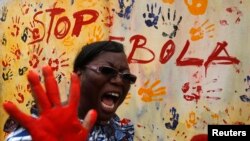The World Health Organization reported that a couple of promising vaccines against Ebola, which is ravaging parts of West Africa, may be ready for use by early next year.
Work on other potentially life-saving experimental therapies is also underway, the organization said on Friday.
The WHO considers the Ebola outbreak the most severe public health emergency in the world today. But, there are no vaccines or medicines to prevent or cure this disease, which is killing about 50 percent of the people it infects.
Given the emergency, WHO experts agreed it is ethical to use experimental medicines and vaccines to try to combat the deadly disease. Work is under way to assess the safety of several possible Ebola vaccines.
GlaxoSmithKline has begun clinical trials of its vaccine in the United States and Britain, to be followed by a trial starting in Mali next week, while NewLink vaccine trials are about to start in the United States and Germany, Reuters reported.
For use as early as January
WHO Assistant Director-General Marie-Paule Kieny said results from these safety tests will be known by the end of the year and, if all goes well, two candidate vaccines may start to be used in Guinea, Sierra Leone and Liberia in early January.
“This will not be a mass vaccination campaign. Let us be clear about that because the quantity of vaccine, which will be available, does not make this possible," Kieny said.
"But we will discuss next week with experts what will be the best target in terms of the first persons to be offered the vaccine. This would be under informed consent. Of course, none of the vaccine will be licensed. So, this is part of an emergency or compassionate use as was described and discussed with experts," she added.
Kieny told VOA that health care and front-line workers are being considered as candidates for the vaccines. Another option, she said, may be to offer the vaccines to contacts of people who are known to have Ebola, depending on how many doses are available.
“What we will have to do very soon is start working with the community and have community mobilization. You know that the situation, the political situation is quite unstable. The population is very vulnerable," she said. "There is some violence. They do not understand what is happening. So, it will be very important that the community, through the community leaders, are brought on board.”
Blood transfusions possible
The use of blood transfusion and infusion of human serum from Ebola survivors is recognized as a “safe treatment,” but donated blood must be screened for infections including HIV and hepatitis, Kieny said.
She said not enough people have been treated with this therapy to know whether it is effective. However, Kieny said there is anecdotal evidence of people having survived because of this treatment.
"But, there is a lot of enthusiasm indeed because this is something which is available on site. This is something where the African population does not have to wait for anybody else to develop it for them," she said. "So this is why there is a lot of enthusiasm.”
Kieny said volunteer donors will have to be screened to make sure their blood is free of the Ebola virus. She said these tests are routinely used in the field.
WHO reports 6,263 people are infected with Ebola, and that 2,917 have died of the disease.
It said these figures are far greater than those from all previous Ebola outbreaks combined. Yet, the WHO warns even these large figures vastly underestimate the true scale of the epidemic.
Some material for this report came from Reuters.










